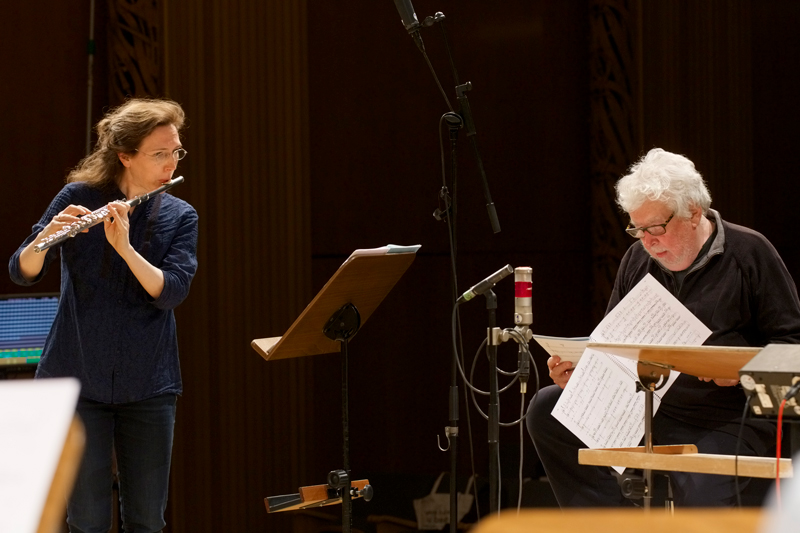20. April 2022
Sir Harrison Birtwistle
It is with great sadness that we learned of Harrison Birtwistle’s passing this past Monday. We worked with him last intensively in the context of the Musikfest Berlin and our Musikfabrik im WDR series, as composer and conductor, and associate many warm, funny and musically exhilarating moments with him.
Carl Rosman shares a personal memory of the composer that tells us much about his warm and humorous nature.
His music will remain.
Perhaps now that Harry isn’t with us any more this story can finally be told.
I had a bit of a Birtwistle phase in 2019: a long-term project of reviving his withdrawn Four Interludes for a Tragedy (for basset clarinet and tape) came to fruition thanks to Tom Hall’s reconstruction of the lost tape part from Peter Zinovieff’s original materials. I performed the Interludes that May at the University of Surrey, meeting Peter in the process. So when English National Opera revived Harry’s Mask of Orpheus (for which Peter wrote the extraordinary libretto) in October, I decided to go along. The only night which really fitted around the Ensemble Musikfabrik schedule was the first night, so I thought I might as well do it properly—I invested in a seat at the front of the dress circle and brought a suit.
Nic Hodges also travelled over from Germany for the occasion, so we met up beforehand for a cup of tea and a chat. We then strolled on down to the Coliseum; we were seated in different parts of the auditorium so after cloaking our things we went our separate ways. I was wondering if I would bump into Harry at some point—I had only met him properly a couple of years before, around Ensemble Musikfabrik’s performances of his Five Lessons in a Frame in Köln and his Dowland arrangements in Berlin. (The Dowland is a particularly precious memory for the ensemble: Harry is certainly not the best of the conductors to have shared the Berlin Philharmonie stage with us, but by the time he had gently guided us through his arrangements we wouldn’t have swapped him for anyone else in the business.) I decided a trip to the conveniences was prudent, and on my way there ran into Harry himself, who had presumably just completed a similar mission. We exchanged greetings and a quick hug. Perfect, I thought: I presumably wouldn’t manage to spend any serious time with him on such a busy occasion but I had at least managed a crossing of paths.
It was definitely an all-star audience. The entire London new music community seemed to be present, and for good measure Alfred Brendel was two seats to my left. In the second interval I went downstairs to see if I could find Nic. Instead I found Harry again, and Peter Zinovieff. Peter introduced me to Harry: “Harry, this is Carl, he played our Interludes”. To which Harry replied “yeah, I know him, he’s my friend”. I must have blushed profusely.
The opera was greeted with thunderous applause and as soon as Harry shuffled on stage the audience rose to their feet as one. Peter was also up on stage in his capacity as librettist and received a hearty kiss on the cheek from Harry. On my way out, into whom should I bump but Harry again. I congratulated him; he asked if I was there alone and at my “yes, I am” grabbed my hand and dragged me into the lift and up to the first-night reception. It was a bit loud and crowded up there, so he retired, drink in hand, to a less densely populated part of the upper circle foyer, along with Peter and his wife Jenny. We chatted for a bit and then the Zinovieffs took their leave. Harry sat there for a bit longer and then grabbed my hand again: back into the lift, down to the ground floor foyer, and straight out the door, pausing only to give a hug to the extravagantly-dressed costume designer.
As he charged out into the streets of Soho I asked if he was taking us anywhere specific. “Yeah.” Soon we arrived at the Garrick Club, where he was a member, and headed straight to the dining room. (I was glad I had brought that suit.) He ordered a bottle of a very muscular Pinot Noir and told me to pick something to eat. So we spent an hour or so chattering away on various subjects (in our few conversations these invariably included Alan Hacker and Reginald Kell, my two favourite clarinettists on record, one of whom was Harry’s collaborator and colleague for forty-odd years and the other of whom was Harry’s own clarinet teacher). We had pretty much finished off the bottle when Sir David Pountney (Director of Productions at ENO during Mask of Orpheus’ original run in 1986) arrived and we had a bit more of a natter about the evening’s proceedings.
Eventually the dining room shut up shop and Harry headed up to bed. I wandered along to the Groucho Club to rejoin Nic Hodges for a final martini, and then toddled off towards my hotel, with an occasional actual laugh along the way.
I did have another chance to meet Harry after that: he came to Nic’s recording of Gigue Machine and other pieces at the WDR not long after, and I snuck in as page-turner, so some more fine memories resulted. Without the pandemic there would have been even more, of course. But as compensation there is, at least, the music: and there is a lot of it, and as far as I’m concerned the best of it can stand comparison with literally anything.
Carl Rosman

